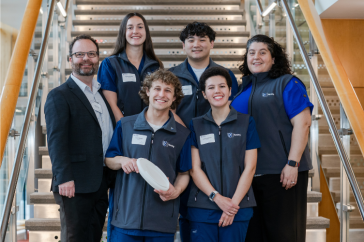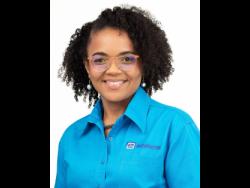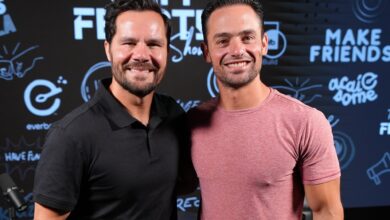UNH Nursing Students Bridge Healthcare and Entrepreneurship

In just a few short months, four UNH nursing students turned their COVID-related frustrations into entrepreneurship that may ultimately help address a significant healthcare problem.
It all started when nursing student David Brown decided to join the Digital Health Ideathon this February to make up for lost clinical hours due to COVID-19. He also encouraged his classmates Sophie Grondin, Cecilia Robison and Matthew Harry, fellow nursing majors, to participate in the Ideathon, which is hosted annually by UNH’s College of Health and Human Services and the Peter T. Paul Entrepreneurship Center.
During their clinical rotations at long-term care facilities, the four sophomores had previously noticed that undiagnosed urinary tract infections (UTIs) were a common problem. After brainstorming, they conceived a device that tests urine directly in toilet bowls to detect these infections.
The idea, which developed into Info-P, won the competition and inspired the students to enter the Paul J. Holloway Competition, UNH’s premier business plan competition. The team has advanced through the competition and will compete with five other teams for a $15,000 prize in the finals on May 8.
UTIs as a Healthcare Problem
UTIs cost healthcare facilities an average of $2.3 billion a year, and 15% to 50% of all people residing in long-term care facilities experience a UTI at some point, according to Brown.
Undiagnosed UTIs lead to even more significant problems for patients, adds Grondin.
“There are so many detrimental side effects, especially in the older adult population, such as delirium, that can lead to several bad outcomes,” Grondin says. “One of the worst outcomes is falls because they may try to get up on their own and injure themselves further.”
Brown notes that treating UTIs with antibiotics also has risks, as some antibiotics can disrupt the balance of bacterial cultures throughout the body.
The Student-Proposed Solution
The group’s small device is designed to sit in a toilet where it measures urine for elevated or decreased biomarkers that indicate the patient is at risk for developing an infection. The device would then digitally transmit the urinalysis to the patient’s medical record and automatically alert caretakers to the potential issue.
“Our product is focused on screening those initial indicators before a full-on infection,” Brown says. “These could be treated with things like cranberry juice, increased fluids and adding some acetaminophen or Tylenol, which naturally help prevent infections and avoid antibiotics.”
The team is conducting market research with long-term care facilities to determine their potential interest and price points. Along the way, the students are getting advice from faculty and students in mechanical engineering and computer science, who have assisted with the technology and design of the product.
While Info-P will likely be marketed to long-term care facilities, the product has other potential uses at home and in the medical community.
“One of my professors suggested this could really help chemotherapy patients who are very susceptible to getting UTIs,” Robison says. “She told me about one person who did get a UTI because of their chemo treatment, and she didn’t know until she went in for her next round of chemo, and it would have helped if she had an at‑home urine device.”
Urinalysis can also be used to detect proteins, glucose and drugs, which opens opportunities for further product development, according to Brown.
“One of the things we’re thinking about is selling the device to a company that can produce this. But we want to keep the patent and the ability to make cartridge systems so that we can continually adapt this device to whatever we need in the future,” Brown says.
The Next Steps
Winning the Holloway Competition would allow the Info-P team to focus on a patent and other critical components of the development process, including additional research and going through the Food and Drug Administration review process.
Regardless of the competition’s outcome, the product’s development will continue this summer thanks to a $6,000 seed grant from the Entrepreneurship Center.
Clinical Associate Professor Alyssa O’Brien has been one of the team’s biggest mentors and supporters through the development process. O’Brien says she’s stretched her business knowledge to help the students, and it has been a rewarding experience.
“Watching the team develop, problem solve and stretch themselves out of their knowledge comfort zone is an experience, as an educator, that has brought so much joy and excitement to my semester,” O’Brien says. “The team has taught themselves everything from engineering to business models to marketing in the process of working through their ideas and preparing for the competition.”
While all four students are passionate about nursing and helping people, this journey into entrepreneurship has emphasized that they can positively impact people’s lives in multiple ways.
“This is a great example of how students should take advantage of every opportunity they can in college,” Harry says. “What started as a make-up assignment for clinical hours, and now we’re in one of the biggest competitions at UNH, with a chance to win $15,000.”



